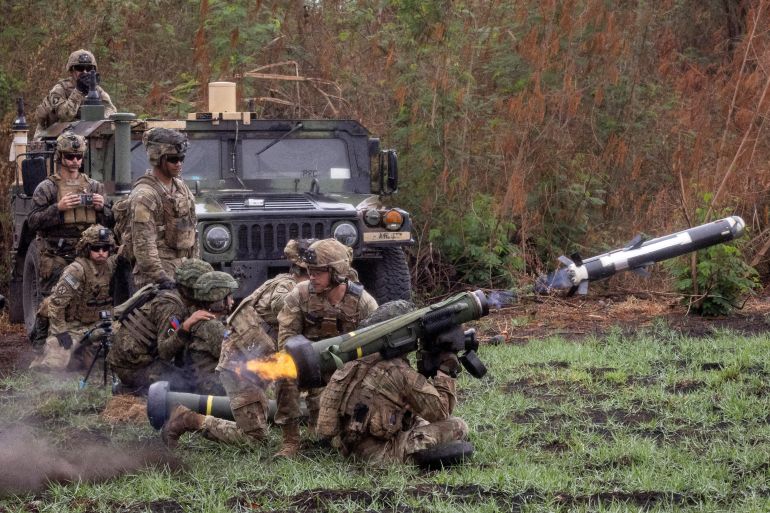US, Philippines, Japan set to hold first-ever joint naval drills
Drills come as the US and China ramp up military diplomacy in the Asia Pacific, staging more frequent war games with allies and partners.

The coastguards of the United States, Japan and the Philippines are set to launch maritime exercises in the South China Sea, in the first such drills between the three countries at a time of growing concern about China’s activities in the region.
The exercise in waters off the Bataan province of the Philippines will begin on Thursday and last until June 7.
Keep reading
list of 4 items‘Provocative, dangerous’: China blames US for air confrontation
US says China intimidates Philippine vessels in South China Sea
‘Ironclad’: Biden, Marcos Jr affirm US-Philippines security ties
The drills come as Washington ramps up military diplomacy in the region, staging more frequent war games with allies and partners in the South China Sea, the waters around Taiwan as well as the western Pacific.
China, too, has increased drills in the strategic waterways.
It has conducted military exercises with Laos, Singapore and Cambodia this year and is set to send warships to a multilateral naval exercise hosted by Indonesia this month.
Armand Balilo, a spokesperson for the Philippine coastguard, told reporters in Manila on Monday that the trilateral drills were an initiative of the US and Japan, while Australia would join as an observer.
Four Philippine vessels and one each from the US and Japan will participate in exercises designed to improve search and rescue collaboration and law enforcement, he said.
The Philippines was approached by Japan and the US about holding joint maritime exercises in February, the same month when Manila accused China of aggressive activities in the South China Sea, which Beijing claims almost in its entirety.
“This is a usual routine activity among coastguard agencies,” Balilo said. “There is nothing wrong with holding exercises with your counterparts.”
The US, Japan and Australia have frequently condemned China’s militarisation of the South China Sea, and have sought to engage more closely with the Philippines since Ferdinand Marcos Jr took over as president last year from pro-China predecessor Rodrigo Duterte.
The Philippines has been increasingly vocal about China’s conduct in the strategic waters, including over its alleged use of a “military-grade laser” against a vessel supporting a resupply mission to a ship in the disputed waters.
Balilo said the upcoming maritime exercise will include counter-piracy simulations, and possibly an interception exercise involving a vessel carrying weapons of mass destruction.
China is also making a push to deepen military engagement with its southerly neighbours.
In May, China held a rare joint military drill with its landlocked neighbour Laos, as well as exercises with Singapore in the southern reaches of the South China Sea.
And in March, China and Cambodia held drills in Cambodian waters for the first time.
The Chinese defence ministry said on Wednesday that it will send its destroyer Zhanjiang and frigate Xuchang, both equipped with guided missiles, to the 2023 Multilateral Naval Exercise Komodo (MNEK), in Indonesia’s Makassar.
Jakarta has invited 47 nations, including North Korea, Russia, South Korea and the US to the drills that will run from June 4 to 8.
China is also planning a joint drill with some countries of the Association of the Southeast Asian Nations (ASEAN), including Cambodia, Laos, Malaysia, Thailand and Vietnam. The drills are named Amana Youyi-2023.
Relations between China and the US have been tense, with friction between the world’s two largest economies over everything from Taiwan and Beijing’s human rights record to its military activity in the South China Sea.